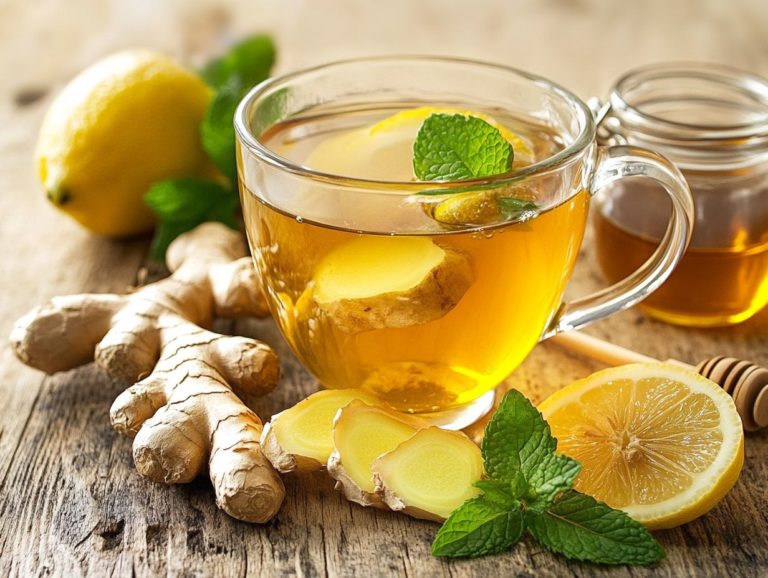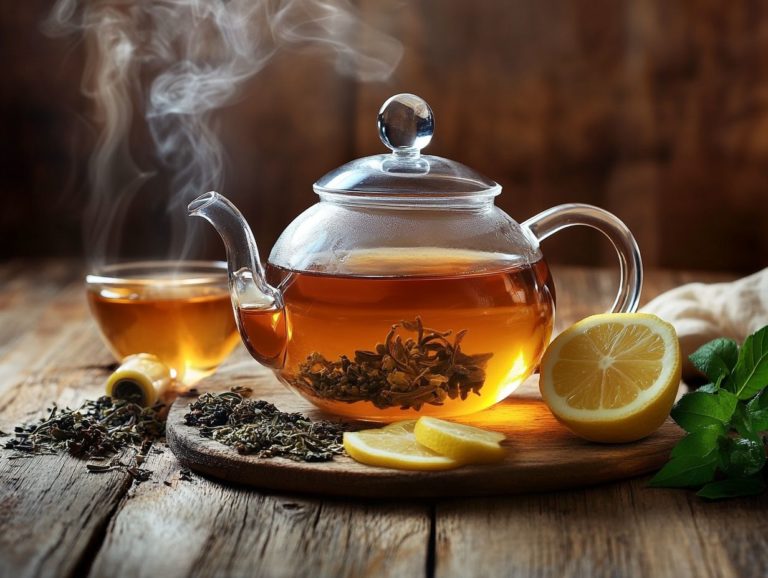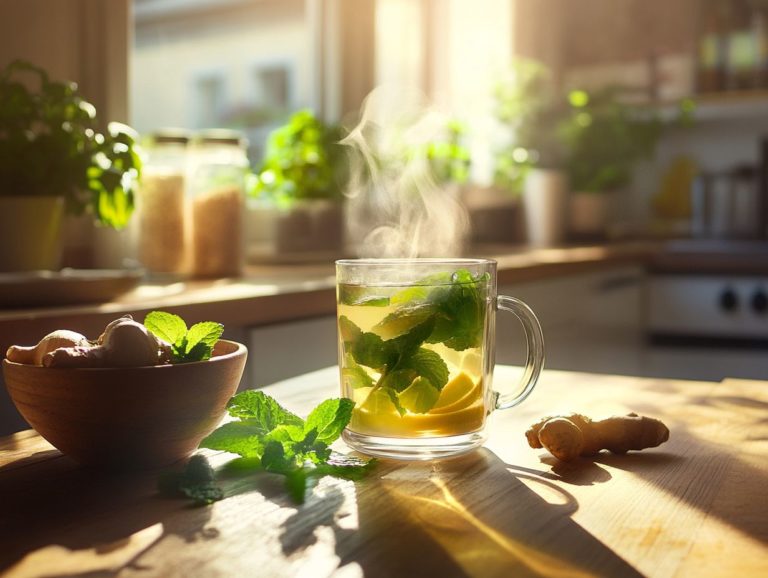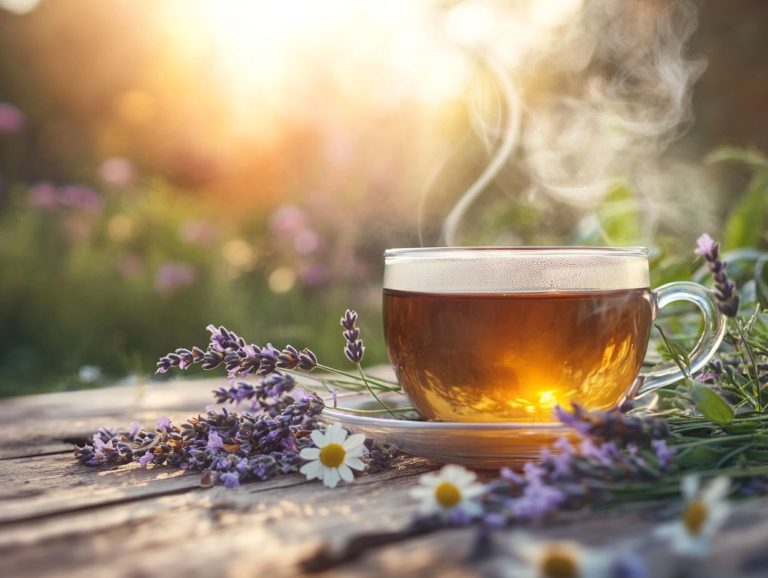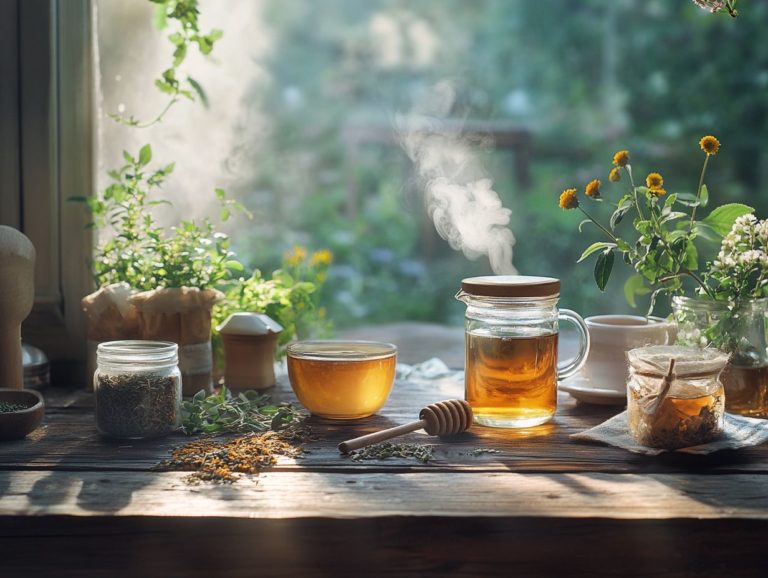5 Herbal Tea Recipes for a Relaxing Evening
In today’s fast-paced world, you might find that seeking moments of tranquility feels like a big challenge.
Herbal teas present a soothing escape, ideal for unwinding after a long day. This article invites you to explore five delightful herbal tea recipes, featuring calming blends like Chamomile and Lavender, alongside energizing mixes such as Ginger and Turmeric.
You’ll also discover how herbal tea can help you relax, along with potential side effects and expert tips for seamlessly integrating these calming brews into your evening routine.
Take this chance to enhance your relaxation routine and elevate your self-care experience!
Contents
- Key Takeaways:
- 1. Chamomile and Lavender Tea
- 2. Lemon Balm and Passionflower Tea
- 3. Peppermint and Valerian Root Tea
- 4. Rose and Hibiscus Tea
- 5. Ginger and Turmeric Tea
- What Are the Benefits of Herbal Tea for Relaxation?
- Frequently Asked Questions
- 1. What are the benefits of drinking herbal tea in the evening?
- 2. How do I make a simple herbal tea for a relaxing evening?
- 3. What are some popular herbs used in herbal tea for relaxation?
- 4. Can I mix different herbs together to create my own herbal tea blend?
- 5. Are there any herbal teas that can help with insomnia?
- 6. How can I incorporate herbal tea into my evening routine?
Key Takeaways:
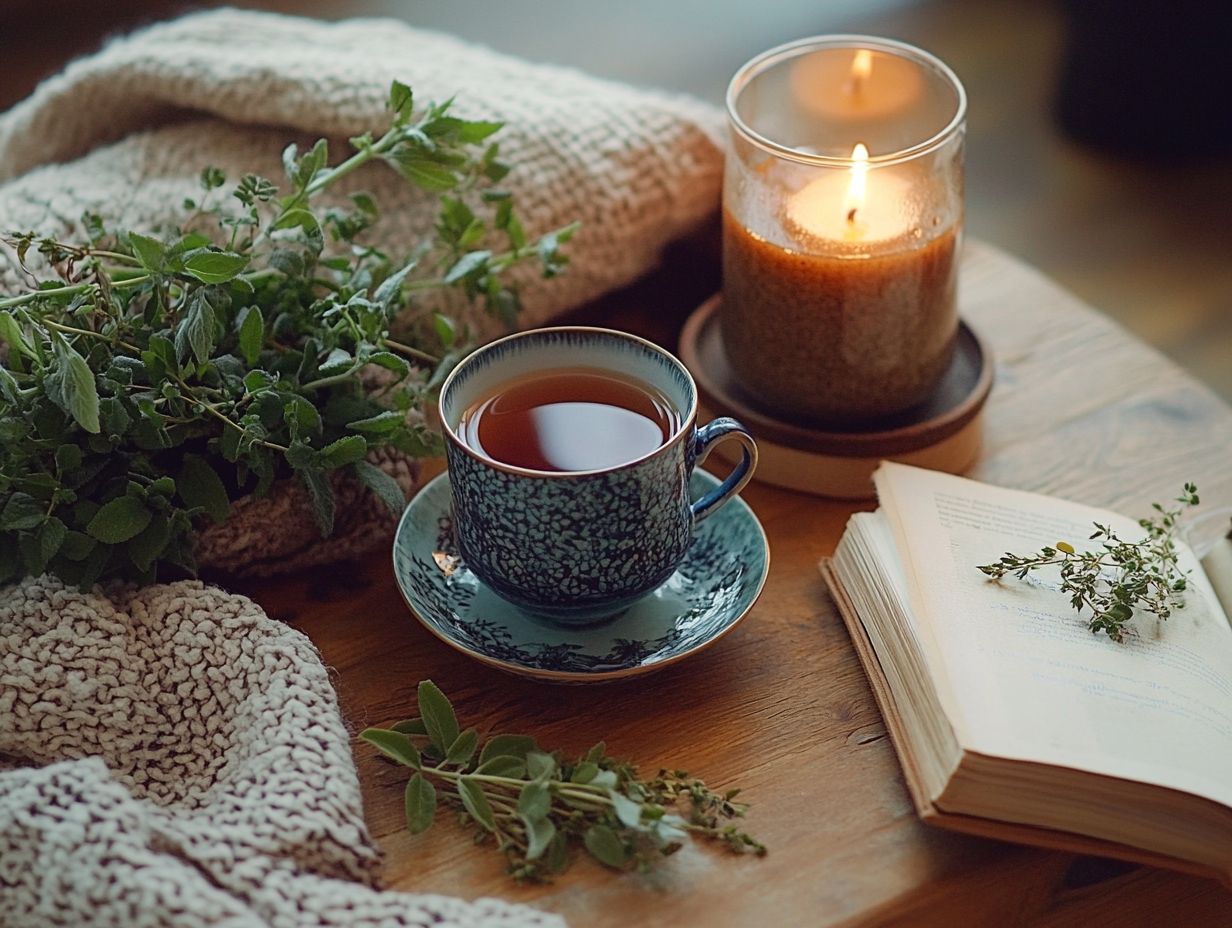
- Incorporating herbal teas into your evening routine can promote relaxation and improve sleep quality.
- Chamomile and lavender tea can help reduce anxiety and promote a sense of calmness.
- Lemon balm and passionflower tea can aid in stress relief and improve mood.
1. Chamomile and Lavender Tea
Chamomile and lavender tea are renowned for their soothing properties. They stand out as two of the most cherished herbal teas, offering remarkable relaxation benefits that make them perfect for anyone in need of stress relief and anxiety reduction.
The exquisite combination of high-quality chamomile and aromatic lavender results in a floral cup that not only calms the mind but also elevates the spirit, delivering a comforting experience that enhances your overall wellness. For those interested in exploring more options, check out these unique herbal teas from around the world.
Chamomile contains apigenin, a natural compound that helps reduce anxiety and improve sleep quality. Meanwhile, lavender is rich in linalool and linalyl acetate, compounds celebrated for their calming effects, capable of significantly lowering heart rate and promoting relaxation.
To enjoy these herbal blends, steep them at the ideal temperature around 200 F and allow them to infuse for 5 to 7 minutes. By weaving these teas into your daily routine, you can effectively manage stress and boost mental clarity. For added benefits, consider trying herbal detox tea recipes for cleansing, paving the way for a more tranquil state of mind.
2. Lemon Balm and Passionflower Tea
Lemon balm and passionflower tea create a refreshing herbal infusion that tantalizes your taste buds while providing calming effects. This makes it an excellent choice for relaxation and stress management.
This delightful brew harnesses the unique properties of both herbs. The light citrus flavor of lemon balm uplifts your mood while soothing your nerves. Passionflower enhances this effect with its traditional reputation as a powerful natural remedy for anxiety.
To craft a soothing cup, steep a teaspoon each of dried lemon balm and passionflower in hot water for 10 minutes. Strain it and add a hint of honey for sweetness. This delicious blend not only eases a hectic day but can also serve as a comforting nighttime ritual. For more ideas, check out these 5 delightful DIY herbal teas for wellness.
3. Peppermint and Valerian Root Tea
Peppermint and valerian root tea is a delightful blend that offers you the refreshing taste of peppermint alongside the calming effects of valerian root. This makes it an effective herbal remedy for easing anxiety and promoting relaxation.
The menthol in peppermint can work wonders for soothing digestive discomfort, acting as a natural antispasmodic to relieve bloating and cramping. Meanwhile, valerian root has long been celebrated for its supportive role in mental well-being, often used to enhance sleep quality and alleviate stress.
To maximize the therapeutic effects, brew the tea by steeping both ingredients in hot water for about 10 minutes. Savoring this comforting drink in the evening can create a tranquil atmosphere, paving the way for a restful night ahead. For those seeking additional help, consider trying 5 must-try herbal preparations for better sleep.
4. Rose and Hibiscus Tea
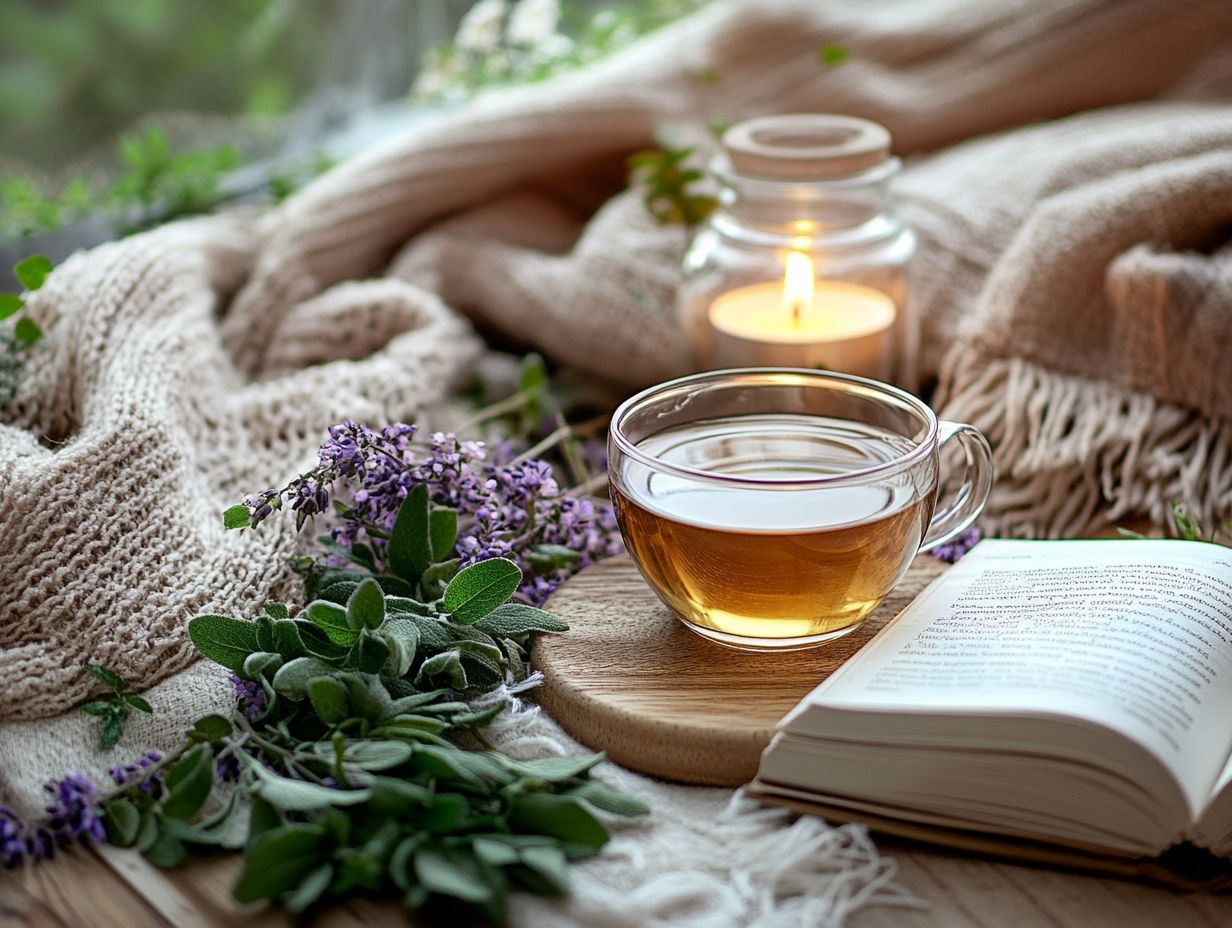
Rose and hibiscus tea presents you with a vibrant, floral cup that not only delights your taste buds but also offers a wealth of health benefits. With its anti-inflammatory properties, it helps reduce swelling and becomes a perfect choice for anyone seeking a soothing herbal drink.
This blend helps reduce stress and anxiety, elevating your mood while fostering a sense of calm. Rich in antioxidants, hibiscus may assist in lowering blood pressure and enhancing heart health. The gentle aroma of rose wraps you in a comforting embrace for your mental well-being.
To indulge in this delightful tea, simply steep dried petals in hot water for about five to seven minutes. Alternatively, brew it strong and chill it for a refreshing iced tea. For added benefits, consider trying herbal tea for anxiety relief by adding honey or lemon to turn this tea into a delightful self-care moment, inviting you to indulge in a little luxury every day.
5. Ginger and Turmeric Tea
Ginger and turmeric tea is a remarkable herbal infusion that offers potent immune support and helps reduce swelling, transforming it into an exceptional wellness tonic. It not only aids in digestion but also enhances your relaxation experience.
This delightful blend helps reduce stress, promoting a sense of calm and well-being. With its rich antioxidant content, ginger delivers a spicy kick while playing a vital role in reducing oxidative stress within your body. Turmeric, known for its health benefits, is packed with curcumin, which combats inflammation and elevates your mood. Together, these ingredients make a soothing drink for any time of the day.
To craft this healthful tea, simply steep fresh ginger slices and turmeric roots in boiling water, then elevate the flavor with a touch of honey or lemon.
What Are the Benefits of Herbal Tea for Relaxation?
Herbal tea stands as a renowned ally in your quest for relaxation, offering a splendid array of calming effects and stress relief that can significantly enhance your mental health and overall wellness. Herbal teas like chamomile, lavender, and peppermint soothe your senses with calming aromas that not only comfort you but also work to alleviate anxiety symptoms.
When you incorporate herbal tea into your daily routine, you’ll likely notice a remarkable decline in stress levels. Take chamomile, for example; it’s celebrated for its gentle sedative effects that can promote better sleep and elevate your mood. Lavender, with its delightful fragrance, helps lower heart rates, encouraging tranquility. Meanwhile, peppermint offers a refreshing taste that can clear your mind and boost feelings of alertness, making it perfect for overwhelming moments. For those interested in making their own blends, check out this guide on how to make your own herbal tea at home.
Together, these options illustrate how herbal tea can be a simple yet powerful tool for nurturing your emotional and mental well-being, including 5 delicious herbal tea blends to try that add variety to your experience.
How Do These Ingredients Help with Relaxation?
The ingredients in herbal tea, like chamomile, lavender, and valerian root, have been scientifically proven to offer profound relaxation benefits. They provide calming effects that help alleviate stress and anxiety.
These herbs contain specific compounds, such as apigenin in chamomile, which binds to receptors in your brain that promote sleep and reduce anxiety. Lavender houses linalool and linalyl acetate, which can lower your heart rate and blood pressure, contributing to calmness. To enjoy these calming benefits in a refreshing way, try some iced herbal tea recipes for summer. Valerian root contains valerenic acid, which may enhance the levels of gamma-aminobutyric acid (GABA) in your brain, further facilitating relaxation.
Together, these compounds intricately interact with your body s neurotransmitters, potentially playing a vital role in improving mental health and enhancing your overall well-being.
What Are the Possible Side Effects of Herbal Tea?
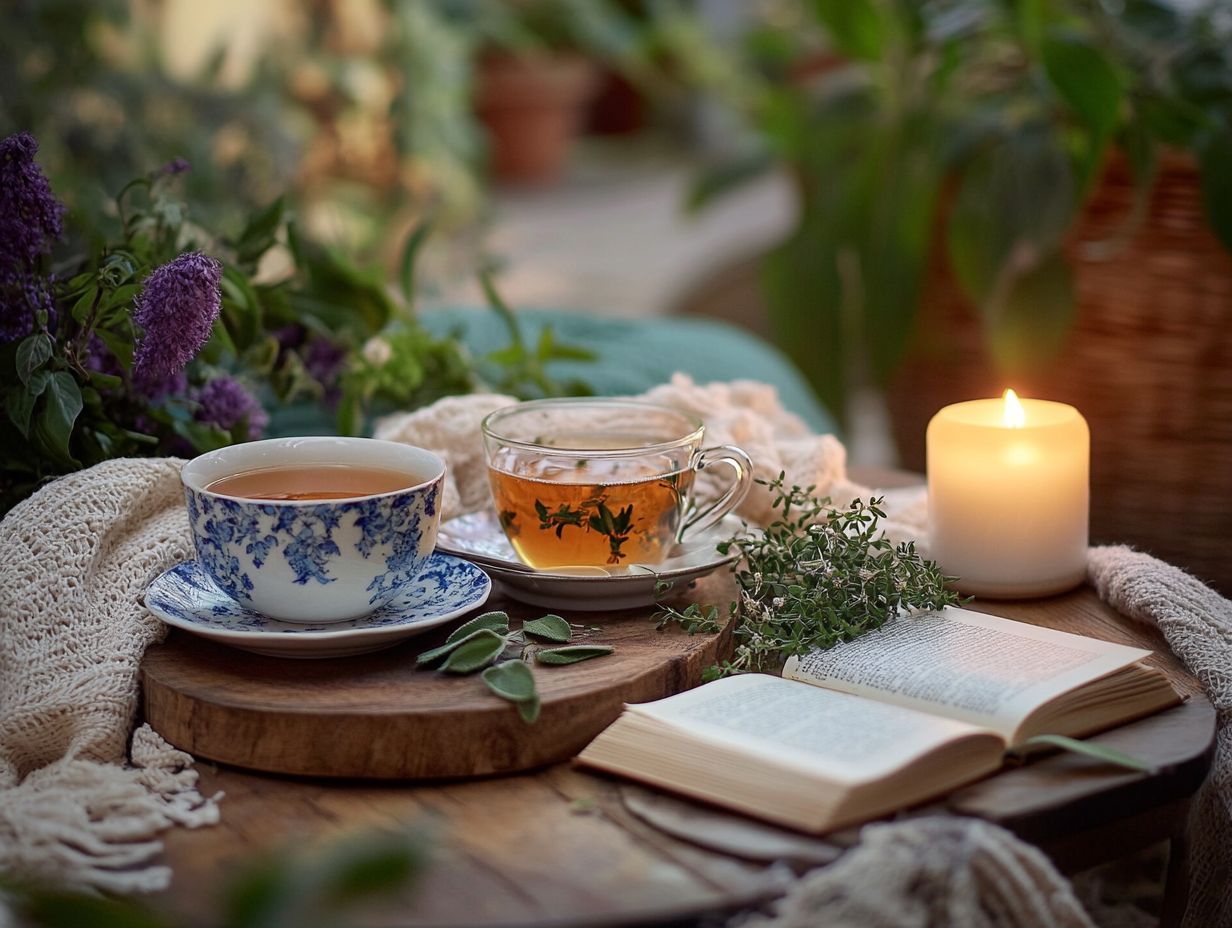
While herbal tea is generally viewed as a safe choice, it s wise to stay informed about potential side effects. This is especially true if you tend to indulge in large quantities or have specific health conditions.
Common side effects may include digestive issues, such as nausea or stomach cramps. Certain herbs might provoke allergic reactions in sensitive individuals. For example, if you are allergic to plants in the daisy family, chamomile may not be suitable for you. Similarly, peppermint can worsen symptoms for those with GERD, which causes heartburn.
Be cautious with licorice root, as excessive consumption can lead to elevated blood pressure, posing risks for individuals with hypertension. It’s crucial to enjoy herbal tea in moderation, particularly if you have underlying health issues, to minimize any potential interactions and side effects.
Are There Any Precautions to Take When Drinking Herbal Tea?
When you enjoy herbal tea for relaxation and stress relief, it s important to take certain precautions to ensure safety and enhance the health benefits of these herbal remedies.
You should be particularly cautious if you re pregnant, nursing, or have specific health conditions. For example, chamomile might trigger allergic reactions in those sensitive to plants in the ragweed family. Some herbal teas can also affect blood pressure or interact negatively with medications like water pills or steroids.
If you re taking prescription drugs or managing chronic illnesses, it s essential to consult your healthcare provider before introducing new herbal varieties into your routine. This ensures safety and benefits.
How Can One Incorporate Herbal Tea into Their Evening Routine?
Looking for ways to relax? Herbal tea could be your perfect companion! Incorporating herbal tea into your evening routine can significantly enhance your relaxation experience.
To truly maximize its soothing effects, aim to sip on herbal tea about an hour before bedtime. This timing allows your body to absorb its calming properties effectively. Pairing your tea with a relaxing activity like diving into a favorite book or enjoying a few minutes of meditation can create a peaceful atmosphere that fosters restful sleep. For additional support, consider trying top DIY herbal remedies for stress relief to enhance your relaxation routine.
When choosing your herbal tea, consider your flavor preferences. Options like chamomile or lavender offer gentle aromas that promote tranquility, while peppermint can introduce a refreshing twist. Don’t hesitate to experiment with different blends to find what resonates with your unique tastes. You might also enjoy trying herbal bath recipes for relaxation to enhance your calming experience.
What Are Some Other Ways to Relax in the Evening?
Beyond herbal tea, you have a world of options to unwind in the evening, each adding a unique touch to your calming routine. Consider mindfulness practices, light stretching, or indulging in hobbies that enhance your mental well-being.
- Meditation: This can elevate your relaxation experience. By focusing solely on the present moment, you can effectively shed the stress of the day.
- Yoga: A gentle method to release tension, combining breathwork and physical movement for soothing effects.
- Aromatherapy: The right essential oils in a diffuser or bath can enhance your relaxation.
When combined, these techniques harmonize beautifully with a warm cup of herbal tea, creating a holistic ritual that nourishes both body and mind, cultivating an atmosphere of peace and tranquility.
Frequently Asked Questions
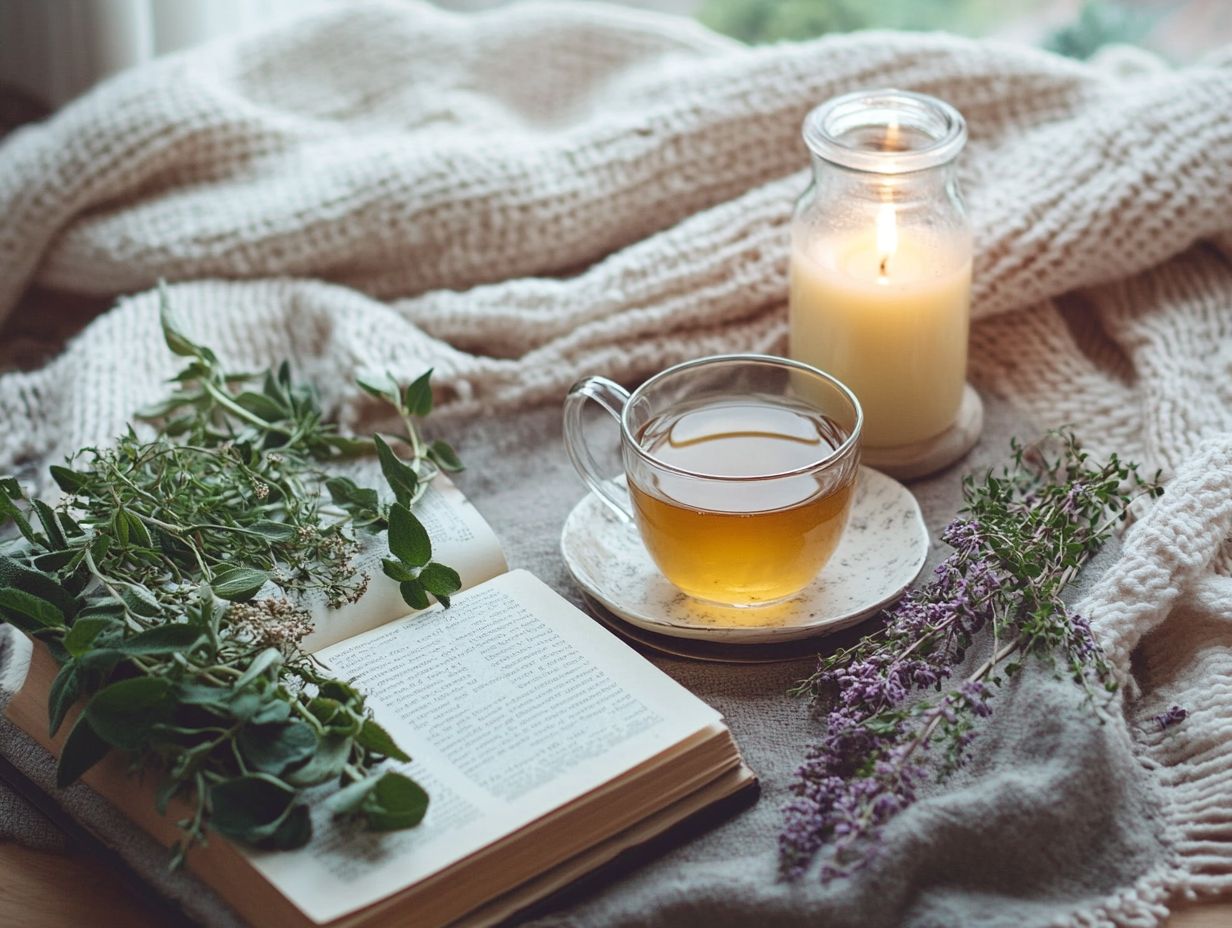
1. What are the benefits of drinking herbal tea in the evening?
Drinking herbal tea in the evening can help promote relaxation, reduce stress and anxiety, aid digestion, and improve overall sleep quality.
2. How do I make a simple herbal tea for a relaxing evening?
To make a simple herbal tea, bring water to a boil. Pour it over a tea bag or loose herbs. Let it steep for 5-7 minutes before enjoying. You can add honey or lemon for extra flavor.
3. What are some popular herbs used in herbal tea for relaxation?
- Chamomile
- Lavender
- Lemon balm
- Valerian root (a natural herb that can help calm the mind)
- Passionflower
4. Can I mix different herbs together to create my own herbal tea blend?
Yes! You can mix different herbs to create your own herbal tea blend. Don t be afraid to experiment with different combinations until you find your perfect relaxing blend.
5. Are there any herbal teas that can help with insomnia?
Yes! Some herbs known for their calming properties, such as valerian root, passionflower, and chamomile, can help improve sleep quality and aid in insomnia. Always consult with a healthcare professional before trying any herbal remedies for sleep issues.
6. How can I incorporate herbal tea into my evening routine?
Incorporate herbal tea into your evening routine by making it a part of your wind-down ritual. Set aside 10-15 minutes to enjoy a warm cup of herbal tea before bedtime. This can help you relax and prepare for a restful night s sleep.
Why not try making your own herbal tea blend tonight? It s a delightful way to unwind!


